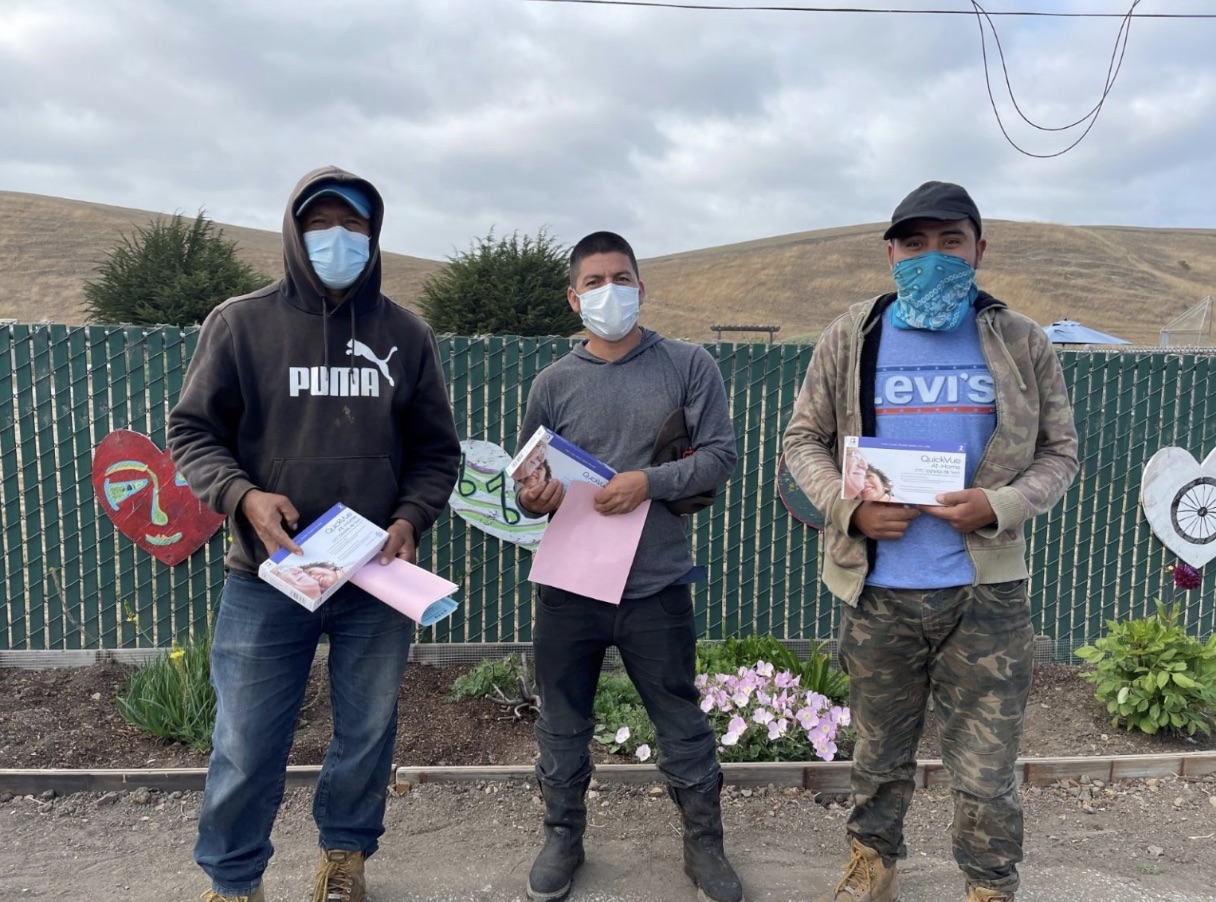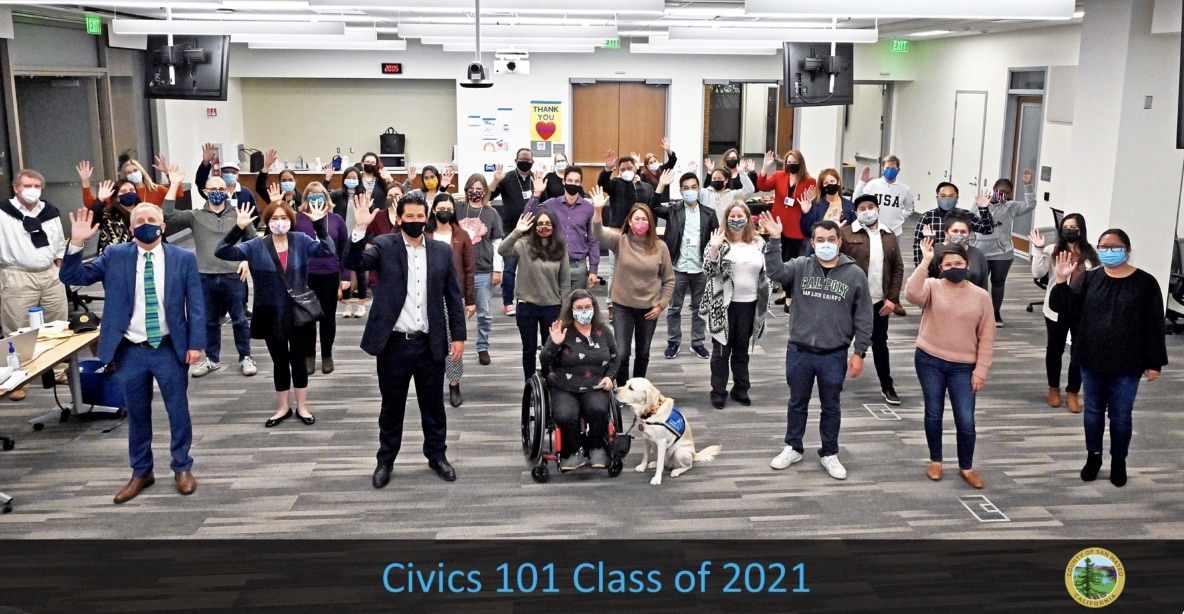|
Getting your Trinity Audio player ready...
|
PUENTE NEWSROOM. From the Puente newsletter February 22nd, 2022.
Donate to Puente

Puente distributed rapid tests to local community members.
 The team at Blue House Farm was feeling lucky.
The team at Blue House Farm was feeling lucky.
Despite the national devastation brought by COVID-19 in its first year, the San Gregorio organic farm’s staff of 25 was only very lightly touched by the virus when it broke out – just two team members fell ill in all of 2020.
“We had really low numbers for a really long time,” says Hayley Reitman, flower manager for Blue House Farm. “I guess maybe I felt kind of in the clear about it. And then I started hearing that Pescadero was having a lot of cases.”
That was December 2021. The Omicron variant had announced itself. From farm to farm and home to home, it spread so contagiously that it took everyone by surprise. Community members of all backgrounds got sick, but it significantly affected agricultural workers – and any family members they lived with.
Within weeks, around the turn of the new year, roughly 13 out of 25 staff at Blue House Farm had come down with COVID-19.
“Our farmers are related and many live together. Their kids hang out together,” says Reitman. Many single workers on the South Coast live in barracks without private bedrooms; they sleep in bunk beds where there is no room to quarantine.
But there was one big piece of good news at Blue House Farm this winter. Puente had distributed hundreds of rapid antigen tests to local farms since September 2021, long before much of the country had invested in them… and well before the Omicron surge overwhelmed homes, hospitals, and workplaces across the U.S.
Puente’s foresight meant that Blue House Farm had the stock of tests it needed to give each employee at least two antigen tests to take home with them and helped them to understand and track positive exposures at the farm.
“If people tested positive, they were able to get another test to know when they were negative. We could give people really good information and keep them as safe as possible,” says Reitman. “Puente has been such a vital resource for all of us during this time. Just living rurally as we do, I think that it would have been a way different situation if we didn’t have all those rapid tests.”
Outside of Puente’s community-wide PCR testing events, which happened monthly throughout much of the pandemic, the nearest PCR test sites are at least a 30-minute drive away, with the added inconvenience of lost hours from work and additional gas expenses, and for others an impossible task for farm workers who do not have access to a car or time to make the round trip. Some do not have Wi-Fi or the requisite technology, or in some instances, an email address to book an appointment.
From backstock to bust
It all started with a donation.
Last summer, an anonymous supporter of Puente, made a donation and asked Puente to direct the funds where they were most needed.
Executive Director Rita Mancera asked Ophélie Vico, Puente’s Community Health Director, what her department could do with some of that money.
“I just said, ‘Rapid tests!’” Vico recalls.
That was in August. By then, rapid antigen tests – designed to detect COVID-19 with or without symptoms in 15 minutes – were under discussion at Puente. They were widely available in Europe, and affordable, thanks to government subsidies. But they had gained very little traction in the U.S., due in large part to the F.D.A’s lengthy review process and the way the tests were classified by the government – as a medical device rather than a public health tool.
Those delays left rural U.S. communities like the South Coast stranded and vulnerable. At-home tests would have been a perfect countermeasure to the scarcity of PCR testing sites – if only they could access them.
PCR testing itself was still a slow and onerous process. Each time a participant asked Puente for a PCR test, staff would need to schedule the appointment, provide step-by-step instructions on how to swab, package the test in a special medical box for UPS, and drive it 30 minutes to the nearest drop-off site – a journey of an hour and a half, even for just one person’s test.
So, Puente placed an order for 900 rapid tests boxes. They arrived in September. The first 450 were distributed to local families at a regular food distribution event, along with a flyer in Spanish on how to use them.
“We gave each family a box of two rapid tests. They were for everybody. We just wanted families to have them on hand in case they needed them,” says Vico. We also did not want families to have to come to Puente to get them. If they had symptoms, it was better they did not have to drive and potentially expose others to the virus.
At the same time, Puente called up 40 local farms and offered them at least one test per employee. By December, Puente still had a backstock of roughly 100 tests.
“And then we came back from the holidays in January, and it was just outbreak after outbreak,” Vico recalls.
Puente’s tests were gone within days. Participants were calling Puente, asking about them. All of a sudden, “It was a big, big battle to find rapid tests. We prioritize giving tests to people showing symptoms and those who had had close contact with someone with COVID-19. We didn’t have any tests for a short while, until the county gave us a few cases – and then finally our second order from came through.”
Employers everywhere were ambushed by the Omicron variant. In January 2022, the number of Californians who called in sick because they or a family member tested positive for COVID-19 spiked by 320%.
“A lot of the farm owners were calling us and saying, my employees are sick. What are the quarantine guidelines? How do we do this? We don’t know what to do, and we’re losing so many people to quarantine,” says Vico.
In response to those questions and several others, Puente collaborated with local agencies to present an online forum to the South Coast community to give valuable information on how to handle these questions to agricultural employers in the beginning of February. The forum was hosted by the San Mateo County Department of Agriculture/Weights & Measures, and featured Agricultural Commissioner Koren Widdel, San Mateo County Public Health Officer Dr. Frank Trinh and San Mateo County Public Health Nurse Manager Bonnie Holland.
Quarantine requirements are a source of confusion. But the related issue of paid time off has been a pain point for workers in agriculture, who typically only get the state-mandated 24 hours of sick leave (three full days of paid sick leave) per year.
California Gov. Gavin Newsom recently signed a bill guaranteeing 40 hours of paid sick leave to any full-time worker who can prove that they have tested positive, or that a family member has. But the new statewide program only applies to businesses with 26 or more workers, and that leaves out three in 10 workers. Many employers on the South Coast have fewer than 26 workers, and they are not covered.
Fortunately, Puente has a financial assistance program – which has been impacted by calls from farm workers to restaurant staff to school personnel, who have had to quarantine for 10 days or more and have lost a week or two of wages. “A week of no pay is a lot when you’re on a tight budget,” Vico explains. “Bills and rent do not wait. Those expenses have to get paid even if you have COVID-19. We have not heard of people getting any breaks about it.”
A new testing regimen
The pandemic has fundamentally changed how Fifth Crow Farm handles precautionary safety. The 80-acre Pescadero organic farm has a CSA and a presence at several Bay Area farmers’ markets.
Co-owner Teresa Kurtak says adaptability is key. And access to rapid tests has been essential to avoid disruptions like in 2020, when eight staff members came down with COVID-19 before vaccinations were available. Every staff member is now fully vaccinated.
“Repeatedly, we’ve had situations throughout last year where someone was working in a market – and we’d find out two days later that three of our market staff were exposed,” she says. Rapid tests from Puente sorted them out. “It was a huge reassurance and allowed us to act quickly rather than send everybody home, try to get them into an appointment to get a test, and then have to come back to work in a couple of days when they got those test results.”
In another case, a parent reported that her children tested positive, but she felt fine. A rapid test revealed that she, too, was positive. Other staff who worked with her were able to get themselves tested, too.
“Having a rapid test meant that they could come to work, pick up a rapid test, and have the reassurance of, OK, well, I’m negative, at least right now,” Kurtak says.
Rapid testing has become so essential – and the tests were, until recently, so scarce – that a Fifth Crow Farm staffer once drove all the way down to Southern California to buy some, after striking out in Half Moon Bay, Redwood City and Santa Cruz.
PCR tests have largely been a nonstarter, Kurtak says. “It’s been a huge challenge because for the most part, our staff who are Spanish speaking don’t have access to a computer or internet and need help making an appointment. And getting those tests seems to largely be a game of knowing how to use a computer or your phone, knowing how to manipulate the internet. Your results come that way. And so, it’s really inaccessible.”
Questions of equity have also dogged the Biden administration’s massive effort to distribute free rapid COVID-19 tests by mail. Many farm workers on the South Coast do not have mailing addresses. In other cases, ten or more people live at a single address – including multiple families. Rather than use recent census data to determine how many tests were needed, the administration delivered four tests per address – a move that all but ensured it would miss the mark.
Even as the national bottleneck eases, rapid tests are still in short supply. Puente has re-ordered them several times, according to Vico. For Puente, the decision of how to distribute equitably within the community was made in partnership with medical advisors.
Puente staff have also had to comply with a new safety regime, which entails testing themselves at least once a week when working in person, twice if working in person three consecutive days. And also wearing an N95 mask, even if the mandate has been lifted.
It’s anyone guess when this pandemic will shift to endemic status, and we will be living in a world where COVID-19 is treated on par with the seasonal flu. Wealthy countries such as Denmark, England, Norway, Sweden, and Switzerland are already treating it that way by relaxing or ending restrictions. But the deeply unequal vaccine rollout means that only 10.6% of people in low-income countries have received even one dose of a vaccine. A reminder that this is a global issue that it will be solved when equitable access to vaccines, boosters and testing is available in all countries.
“I think this is slowly moving in the direction of something we’re going to have to live with,” says Vico. But in the meantime, Puente’s focus will continue to be not just on distributing tests but supporting participants in the aftermath of a positive result: bringing them groceries in quarantine, signing them up for wage replacement, checking in to make sure they do not need urgent care, and getting them booked for a booster appointment if necessary.
We are grateful to our partners and donors for their generous support to our rural South Coast communities of Pescadero, La Honda, Loma Mar and San Gregorio. Your contribution today will continue providing COVID-19 relief services for low-income families and individuals.
Donate to Puente

Las pruebas en el hogar distribuidas por Puente ayudan a los miembros de la comunidad a salir adelante para prevenir contagio.
El equipo de Blue House Farm se sentía afortunado.
A pesar de la devastación nacional provocada por el COVID-19 en su primer año, el personal de la granja orgánica de San Gregorio de 25 personas solo fue afectado muy levemente por el virus cuando estalló: solo dos miembros del equipo se enfermaron en 2020.
“Tuvimos números realmente bajos durante mucho tiempo”, dice Hayley Reitman, gerente de flores de Blue House Farm. “Supongo que tal vez me sentí un poco claro al respecto. Y luego comencé a escuchar que Pescadero estaba teniendo muchos casos”.
Eso fue en diciembre de 2021. La variante Omicron se había anunciado. De granja en granja y de casa en casa, se propagó de manera tan contagiosa que tomó a todos por sorpresa. Afecto a individuos y familias sin importar su estatus o situación económica, pero afectó significativamente a los trabajadores agrícolas y a los miembros de la familia con los que vivían.
En cuestión de semanas, alrededor del cambio de año, aproximadamente 13 de los 25 empleados de Blue House Farm habían contraído COVID-19.
“En los casos de los trabajadores agrícolas son parientes y muchos viven juntos. Sus hijos pasan el rato juntos”, dice Reitman. En otras situaciones, muchos trabajadores solteros de la Costa Sur viven en barracas sin dormitorios privados; duermen en literas donde no hay espacio para la hacer cuarentena.
Pero hubo una buena noticia en Blue House Farm este invierno. Puente había distribuido pruebas rápidas de antígenos a granjas locales desde septiembre de 2021, mucho antes de que gran parte del país hubiera invertido en ellas… y mucho antes de que la oleada de Omicron abrumara hogares, hospitales y lugares de trabajo en los Estados Unidos.
La previsión de Puente significó que Blue House Farm tenía a mano las pruebas que necesitaba para dar a cada empleado al menos dos pruebas de antígenos para llevar a casa y les ayudó a rastrear las exposiciones positivas en la granja.
“Si las personas dieron positivo, pudieron hacerse otra prueba para saber cuándo ya dieran resultados negativo. Podríamos brindarles a las personas información realmente buena y mantenerlos lo más seguros posible”, dice Reitman. “Puente ha sido un recurso vital para todos nosotros durante este tiempo. Simplemente viviendo en una zona rural como lo hacemos, creo que habría sido una situación muy diferente si no tuviéramos todas esas pruebas rápidas”.
Fuera de los eventos de pruebas de PCR en toda la comunidad de Puente, que ocurrieron mensualmente durante gran parte de la pandemia, los sitios de prueba de PCR más cercanos están a por lo menos 30 minutos en auto, con el inconveniente adicional de horas de trabajo perdidas y gastos adicionales de gasolina, y para otros una tarea imposible para los trabajadores del campo que no tienen acceso a un auto ni tiempo para hacer el viaje de ida y vuelta. Algunos no tienen Wi-Fi o la tecnología necesaria o, en algunos casos, una dirección de correo electrónico para reservar una cita en linea.
Del tener reservas a nada
Todo comenzó con una donación.
El verano pasado, unos donadores anónimos de Puente, hicieron una donación y le pidieron a Puente que dirigiera los fondos donde más se necesitaban.
La Directora Ejecutiva, Rita Mancera le preguntó a Ophélie Vico, Directora de Salud Comunitaria de Puente, qué podría hacer su departamento con parte de ese dinero.
“Solo dije, ‘¡Pruebas rápidas!’”, recuerda Vico.
Eso fue en agosto.
Para entonces, las pruebas rápidas de antígenos, diseñadas para detectar COVID-19 con o sin síntomas en 15 minutos, estaban en discusión en Puente. Estaban ampliamente disponibles en Europa y eran asequibles gracias a los subsidios del gobierno. Pero habían ganado muy poca tracción en los Estados Unidos, debido en gran parte al largo proceso de revisión de la FDA y la forma en que el gobierno clasificó las pruebas, como un dispositivo médico en lugar de una herramienta de salud pública.Esos retrasos dejaron varadas y vulnerables a las comunidades rurales de los Estados Unidos, como la Costa Sur. Las pruebas en el hogar habrían sido una contramedida perfecta para la escasez de sitios de prueba de PCR, si tan solo pudieran acceder a ellos.
La prueba de PCR en sí seguía siendo un proceso lento. Cada vez que un participante le pedía a Puente una prueba de PCR, el personal debía programar la cita, proporcionar instrucciones paso a paso sobre cómo tomar la muestra, empacar la prueba en una caja médica especial para UPS y conducirla 30 minutos hasta el lugar más cercano. lugar de entrega: un viaje de una hora y media, incluso para la prueba de una sola persona.
Entonces, Puente hizo un pedido de 900 cajas de pruebas rápidas. Llegaron en septiembre. Los primeros 450 se distribuyeron a las familias locales en un evento regular de distribución de alimentos, junto con un volante en español sobre cómo usarlos.
“Le dimos a cada familia una caja de dos pruebas rápidas. Eran para todos. Solo queríamos que las familias los tuvieran a mano en caso de que los necesitaran”, dice Vico. Tampoco queríamos que las familias tuvieran que venir a Puente a buscarlos. Si tenían síntomas, era mejor que no tuvieran que conducir y exponer potencialmente a otros al virus.
Al mismo tiempo, Puente llamó a 40 granjas locales y les ofreció al menos una prueba por empleado. Para diciembre, Puente todavía tenía una reserva de aproximadamente 100 pruebas.
“Y luego volvimos de las vacaciones en enero, y fue un brote tras otro”, recuerda Vico.
Las pruebas de Puente desaparecieron en unos días.
Los participantes estaban llamando a Puente, preguntando por ellos. De repente, “Fue una gran, gran batalla encontrar pruebas rápidas. Priorizamos realizar pruebas a personas que presentaban síntomas y a aquellas que hayan tenido contacto cercano con alguien con COVID-19. No tuvimos ninguna prueba por un corto tiempo, hasta que el condado nos dio algunas cajas, y finalmente llegó nuestra segunda orden”. Los empleadores de todas partes fueron emboscados por la variante Omicron. En enero de 2022, la cantidad de californianos que se reportaron enfermos porque ellos o un miembro de su familia dieron positivo en la prueba de COVID-19 aumentó en un 320%.
“Muchos de los propietarios de las granjas nos llamaban y decían: mis empleados están enfermos. ¿Cuáles son las recomendaciones de cuarentena? Cómo hacemos esto? No sabemos qué hacer y estamos perdiendo a tanta gente por la cuarentena”, dice Vico.
En respuesta a esas preguntas y varias otras, Puente en colaboración con otras organizaciones, organizó un foro en línea para brindar información valiosa sobre cómo manejar estas preguntas a los empleadores agrícolas a principios de febrero. El foro fue organizado por el Departamento de Agricultura/Pesos y Medidas del Condado de San Mateo, y contó con la participación del Comisionado de Agricultura Koren Widdel, el Oficial de Salud Pública del Condado de San Mateo, Dr. Frank Trinh, y la Gerente de Enfermería de Salud Pública del Condado de San Mateo, Bonnie Holland.
Los requisitos de cuarentena son una fuente de confusión. Pero el tema relacionado del tiempo libre pagado ha sido un punto doloroso para los trabajadores en la agricultura, quienes generalmente solo obtienen las 24 horas de horas de enfermedad exigidas por el estado (tres días completos de licencia por enfermedad pagada) por año.
El gobernador de California, Gavin Newsom, firmó recientemente un proyecto de ley que garantiza 40 horas de licencia por enfermedad remunerada a cualquier trabajador de tiempo completo que pueda demostrar que ha dado positivo en la prueba o que un miembro de su familia lo ha hecho. Pero el nuevo programa estatal solo se aplica a empresas con 26 o más trabajadores, y eso deja fuera a tres de cada 10 trabajadores. Muchos empleadores en la Costa Sur tienen menos de 26 trabajadores y no están cubiertos.
Afortunadamente, Puente tiene un programa de asistencia financiera, que se ha visto afectado por llamadas de trabajadores agrícolas, personal de restaurantes y personal escolar, que han tenido que ponerse en cuarentena durante 10 días o más y han perdido una o dos semanas de salario. “Una semana sin paga es mucho cuando tienes un presupuesto ajustado”, explica Vico. “Las facturas y el alquiler no se hacen esperar. Esos gastos deben pagarse incluso si tiene COVID-19. No hemos oído hablar de personas que obtengan algún descanso al respecto”.
Un nuevo procedimiento para las pruebas
La pandemia ha cambiado fundamentalmente la forma en que Fifth Crow Farm maneja la seguridad preventiva. La granja orgánica Pescadero de 80 acres tiene un CSA y presencia en varios mercados de agricultores del Área de la Bahía.
La copropietaria Teresa Kurtak dice que la adaptabilidad es clave. Y el acceso a las pruebas rápidas ha sido esencial para evitar interrupciones como en 2020, cuando ocho miembros del personal contrajeron COVID-19 antes de que las vacunas estuvieran disponibles. Cada miembro del personal ahora está completamente vacunado.
“En repetidas ocasiones, tuvimos situaciones durante el año pasado en las que alguien estaba trabajando en un mercado, y dos días después nos enteramos de que tres miembros de nuestro personal del mercado fueron expuestos”, dice ella. Las pruebas rápidas de Puente los solucionaron. “Fue una gran tranquilidad y nos permitió actuar con rapidez en lugar de enviar a todos a casa, tratar de concertar una cita para hacerse una prueba y luego tener que volver al trabajo en un par de días cuando obtuvieron los resultados de la prueba.
”En otro caso, una madre informó que sus hijos dieron positivo, pero ella se sentía bien. Una prueba rápida reveló que ella también dio positivo. Otro personal que trabajó con ella también pudo hacerse la prueba.
“Tener una prueba rápida significaba que podían ir a trabajar, hacerse una prueba rápida y tener la seguridad de que, bueno, soy negativo, al menos en este momento”, dice Kurtak.
Las pruebas rápidas se han vuelto tan esenciales, y las pruebas eran, hasta hace poco, tan escasas, que un miembro del personal de Fifth Crow Farm una vez condujo todo el camino hasta el sur de California para comprar algunas, después de estar en Half Moon Bay, Redwood City y Santa Cruz.
Las pruebas de PCR han sido en gran medida un fracaso, dice Kurtak. “Ha sido un gran desafío porque, en su mayor parte, nuestro personal que habla español no tiene acceso a una computadora ni a internet y necesita ayuda para programar una cita. Y obtener esas pruebas parece ser en gran medida un juego de saber cómo usar una computadora o su teléfono, saber cómo manipular internet. Sus resultados vienen de esa manera. Y así, es realmente inaccesible”.
Las cuestiones de equidad también han perseguido el esfuerzo masivo de la administración Biden para distribuir pruebas rápidas y gratuitas de COVID-19 por correo. Muchos trabajadores agrícolas en la costa sur no tienen direcciones postales. En otros casos, diez o más personas viven en una sola dirección, incluidas varias familias. En lugar de utilizar los datos del censo reciente para determinar cuántas pruebas se necesitaban, la administración entregó cuatro pruebas por dirección, un movimiento que casi aseguró que no daría en el blanco.
A pesar de que el cuello de botella nacional se alivia, las pruebas rápidas siguen siendo escasas. Puente los ha vuelto a pedir varias veces, según Vico. Para Puente, la decisión de cómo distribuir equitativamente dentro de la comunidad se tomó en sociedad con asesores médicos.
El personal de Puente también ha tenido que cumplir con un nuevo régimen de seguridad, que implica hacerse la prueba al menos una vez a la semana cuando trabaja de manera presencial, dos veces si trabaja de manera presencial tres días consecutivos. Y también con mascarilla N95, aunque se haya levantado el mandato.
Cualquiera puede adivinar cuándo esta pandemia cambiará a un estado endémico, y viviremos en un mundo donde el COVID-19 se trata a la par que la gripe estacional. Los países ricos como Dinamarca, Inglaterra, Noruega, Suecia y Suiza ya lo están tratando de esa manera al relajar o eliminar las restricciones. Pero el despliegue de vacunas profundamente desigual significa que solo el 10.6% de las personas en países de bajos ingresos han recibido siquiera una dosis de una vacuna. Un recordatorio de que este es un problema global que se resolverá cuando el acceso equitativo a vacunas, refuerzos y pruebas esté disponible en todos los países.
“Creo que esto se está moviendo lentamente en la dirección de algo con lo que tendremos que vivir”, dice Vico. Pero mientras tanto, el enfoque de Puente seguirá siendo no solo la distribución de pruebas, sino también el apoyo a los participantes después de un resultado positivo: llevarles víveres en cuarentena, inscribirlos para el reemplazo de salarios, verificar que no necesiten servicios urgentes. cuidado, y programarlos para una cita de refuerzo si es necesario.
Agradecemos a nuestros socios y donantes por su generoso apoyo a nuestras comunidades rurales de la Costa Sur de Pescadero, La Honda, Loma Mar y San Gregorio. Su contribución de hoy continuará brindando servicios de alivio de COVID-19 para familias e individuos de bajos ingresos.
Donate to Puente





